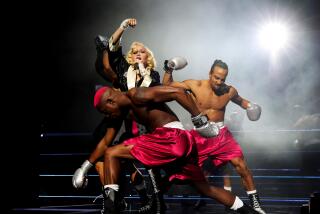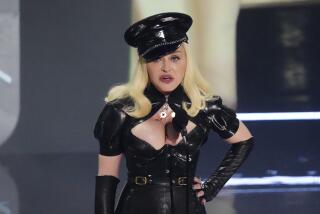MADONNA IS NOBODY’S TOY
- Share via
“TRUE BLUE.” Madonna. Sire.
Wasn’t this supposed to be the year that the pop world said bye-bye to Madonna?
All that media hype in 1985 about her teasing, gimmicky “boy toy” image was enough to turn off anyone. And the backlash was building well before the added exposure of the Playboy and Penthouse photo layouts.
But going against Madonna was a sucker bet. All along, she has shown hints of ambition and sharp show-biz instincts that suggested this cookie is a survivor: the brightness and punch of her hit singles, the good-natured sparkle of her live performances, and her disarming presence in “Desperately Seeking Susan.” Now, “True Blue” adds another strong credential.
Some people will never take Madonna seriously--just as many never took Marilyn Monroe seriously. Novelty images--especially that of a sex symbol--are hard to erase. But talent far outshines novelty in Madonna’s new LP.
The most obvious growth is in the control and character in Madonna’s singing. Where she previously seemed dependent on clever record production, her vocals are so finely tailored that she actually extends the punch and appeal of the production touches. As co-writer and co-producer (with Patrick Leonard and Stephen Bray) of the album, Madonna also demonstrates greater confidence and direction musically.
Like David Bowie, Madonna visualizes music so that her best work seems equally designed with the stage or screen in mind--not just the jukebox. “Papa, Don’t Preach” (written by Brian Elliot, with additional lyrics by Madonna) was tailor-made for video: the story of an unwed young woman wanting her father’s approval after deciding to keep her baby. “White Heat”--which acknowledges its link to the gangster film of the same name by using a voice clip of James Cagney--is a playfully aggressive piece that will work great on stage.
Madonna also shares Bowie’s ability to weave proven pop strains into a contemporary framework. The title song mixes the innocence of ‘50s R&B; with the punch of Spector’s ‘60s classics for a contemporary blend of “In the Still of the Night” and “Be My Baby.” And “Jimmy Jimmy” has all the frisky fun and silliness of prime ABBA.
“True Blue” isn’t revolutionary music, but it is imaginative, highly energized pop that recognizes the limitations and pleasures of Top 40 fare. There are flat spots: The outgoing “Open Your Heart” and message-bound “Love Makes the World Go Round” are equally uneventful. Still, the only bet I’d make after hearing “True Blue” is that Madonna’s got at least four hit singles in the wings.
More to Read
The biggest entertainment stories
Get our big stories about Hollywood, film, television, music, arts, culture and more right in your inbox as soon as they publish.
You may occasionally receive promotional content from the Los Angeles Times.







